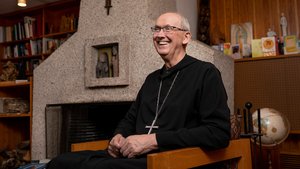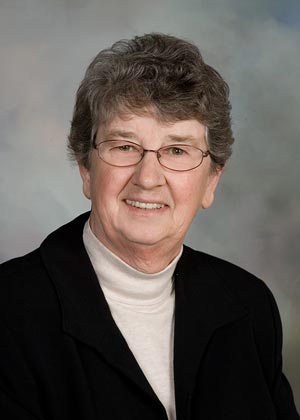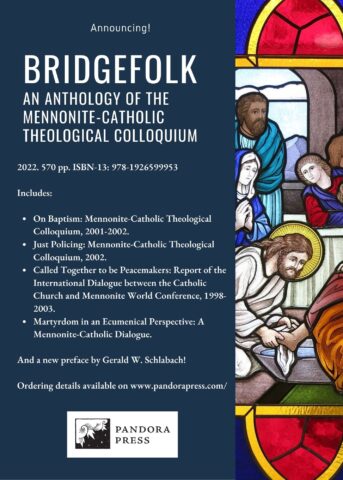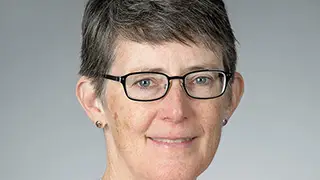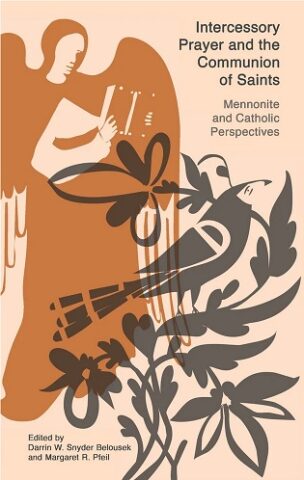When Fr. John Klassen retired from his role as Abbot of Saint John’s Abbey and departed for a six-month sabbatical in January 2024, he also concluded his tenure as Catholic Co-chair of the Bridgefolk board, a position he had filled since its formation. Sr. Ann Marie Biermaier, a board member from the St. Benedict Monastery, graciously accepted the invitation to join Mennonite Samantha Lioi as co-chair.
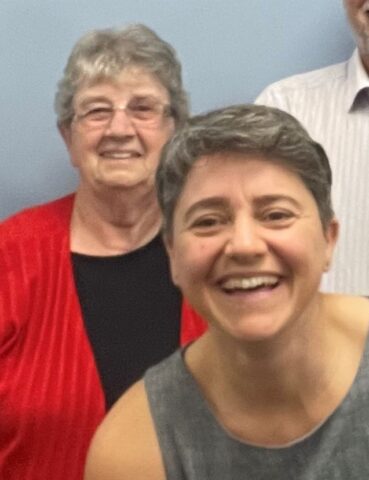
Samantha and Sr. Ann Marie are women of different generations, and both bring a rich diversity of experiences that drew them to ecumenical involvement. Sr. Ann Marie quotes Toni Sorenson as she looks back on her six-decades-long career as a Benedictine sister: “Walking a mile in someone else’s shoes isn’t as much about the walk or the shoes; it’s being able to think like they think, feel what they feel, and understand why they are who and where they are. Every step is about empathy.” Biermaier notes: “I have had several opportunities over the years to attempt to ‘walk in others’ shoes.’ I pray that they and I are better because we’ve shared along the way.”
Living in a religious community has given Biermaier ample opportunities to walk with others. “We are a group of women from a variety of backgrounds—educationally, socially, socioeconomically. We’ve shared formative moments through study and praying together frequently each day. We’ve welcomed individuals from other cultures into our community.” Biermaier also extends welcome through her involvement with the community’s Studium program in which individuals come from around the world to do research, study, and creative work. She finds deep joy in welcoming individuals of other religions and cultures.
At the September 2023 Bridgefolk co-sponsored the Rooted and Grounded conference at Anabaptist Mennonite Biblical Seminary (AMBS), Lioi commented to some new acquaintances, “Some of my best friends are Catholic!” This has been true since childhood when, growing up in north Jersey, both of her best friends from grade school through high school were Catholic. She remains a close friend with Dominique, who is Italian like half of Samantha’s family, and Karla, who is half Mexican, half Okinawan via Hawaii. Samantha remembers meeting Dominique in the bus line one day after school, when they were about eight. “A zealous kid immersed in late-eighties evangelicalism,” Samantha recalls, “I was wearing a small pin that said, ‘Jesus loves you.’ Dominique smiled and said, ‘I like your pin,’ and we soon had a confusing exchange when she asked if I was Catholic, meaning Christian, and I said no and specified the kind of Christian I was.”
Despite having Catholic friends from an early age, Lioi regrets the judgmental attitude she absorbed as a child and youth about “the exclusive rightness of my church’s particular way of being Christian. Especially sad is a lack of connection with my Italian grandmother’s Catholic heritage. My dad’s mom left the Catholic Church to marry my Protestant grandfather, whose father had emigrated from Italy with a bad taste in his mouth from some harsher penance practices he had observed. Yet, my dad bore no hint of shame in telling me about his great aunt Emily, who was a Dominican sister.”
Both Biermaier and Lioi had educational experiences that introduced them to new people and perspectives. Biermaier’s doctoral studies presented a rich opportunity to study with a number of indigenous students. “We exchanged ideas on education, culture, and ways of improving education in our K-16 settings. Through social events we got to know each other personally.”
For her part, Lioi discovered “the rich breadth of Christian history and tradition, including the church year, classic spiritual disciplines including silence, solitude, fasting, celebration and centering prayer, as well as Catholic social teaching. “One of my profs turned me on to Rerum Novarum, and I eagerly studied the full text for a final paper in that class. That same professor dropped phrases like ‘God’s preferential option for the poor’ into theology classes, piquing my interest and planting seeds in me toward a theology of justice and peace.”
For 20-plus years, Biermaier made frequent trips to The Bahamas to work in the Benedictine education program there. She assisted students completing their degrees with the College of Saint Benedict and Saint John’s University. She lived in Nassau for two years, which she describes as “an immersion into the culture – educationally, spiritually, and socially. I grew in understanding their values, their desires for their country and world, and their love of nature and the earth.”
Biermaier made additional trips to Tanzania and India, exploring semester-long study opportunities for education students. As she explored what it might mean for US students to study in those cultural and educational environments, she also considered how African and Asian students would do as they adjusted to the College of St. Benedict and St. John’s University. A pilgrimage to Europe allowed Biermaier to trace the paths of Benedict and Scholastica in Rome and Subiaco. “As I walked the steps up the hill from the town of Subiaco to where Benedict lived, I felt deeply his love for the earth, love for prayer, the countryside, and his love for where his sister lived. I came home with a richer understanding of my Benedictine heritage.”
For her part, Lioi lived for ten months with an American family in Tanzania in her mid-twenties. There she developed friendships with Anglican pastors/missionaries from Australia and England, and many varieties of expatriate Christians worshiped together at an intentionally ecumenical local church. When she returned to the United States and enrolled at AMBS, her emerging Mennonite identity became grounded, fleshed out. “Marlene Kropf became an important mentor, and my formation as a worship leader was threaded through with Catholic contemplative spirituality and attentiveness to liturgical seasons. Professors Mary Schertz’s and Alan Kreider’s ways of reading and teaching the Bible and church history and mission profoundly impacted me.”
In summer 2007, Bridgefolk met on the AMBS campus. Lioi participated as a volunteer and found herself “immersed in mutual love and respect, joy, personal storytelling, worship, earnest faith, energizing conversations.” She was pleasantly surprised several years later to be invited to serve on the Bridgefolk board. “What a gift to be part of Bridgefolk’s ongoing growth in love, understanding, compassion, and relational peacemaking as we ‘proceed through friendship.’ I look forward to the Spirit’s winsome guiding as we continue to watch and listen for what is next. May we find—and spread—more healing and transformation as we continue to embrace one another on the bridge.”
Biermaier’s participation in Bridgefolk began when her good friend and fellow Benedictine sister Theresa Schumacher joined the Bridgefolk board. “Becoming part of Bridgefolk gave me another opportunity of ‘lifelong learning.’ I wanted to learn more about the Mennonite-Catholic relationship—the peace-loving, sacramental emphasis given within each church’s perspective. I look forward to continuing this search as I take on this new role with the board.”

